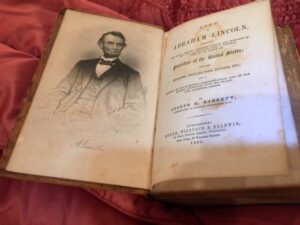 FG owns the first complete contemporary biography of Abraham Lincoln. The book includes copper plate engravings, and a frontispiece of a bearded Lincoln, by Joseph H Barrett, a close personal friend of Lincoln, a newspaper editor and lawyer. Barrett wrote this 1865 publication, in part, at the time Lincoln pursued his second presidential term. Such a book, widely read, became influential. Lincoln won his second term, inaugurated March 4, 1865, then assassinated April 14, 1865. The author included the demise of Lincoln in the book, fast writing, and publishing, for those days. The book is NOT short at 842 pages!
FG owns the first complete contemporary biography of Abraham Lincoln. The book includes copper plate engravings, and a frontispiece of a bearded Lincoln, by Joseph H Barrett, a close personal friend of Lincoln, a newspaper editor and lawyer. Barrett wrote this 1865 publication, in part, at the time Lincoln pursued his second presidential term. Such a book, widely read, became influential. Lincoln won his second term, inaugurated March 4, 1865, then assassinated April 14, 1865. The author included the demise of Lincoln in the book, fast writing, and publishing, for those days. The book is NOT short at 842 pages!
The author wrote an earlier book on Lincoln published in 1860, a double header: A Life of Lincoln and his important speeches, including a Life of Hannibal Hamilton of Maine. So Joseph Barrett got a head start on the Life of Lincoln. After 1860 he wrote two more books around the 1865 date on Lincoln, and one more in 1904.
A Thick Octavo
When I say the 1865 book became widely read, in those days, publishers often printed books in serialized form. So the cost to the reader remained lower and, as the author says in his preface, “ the work…is trustworthy, complete, and as accessible to all classes of loyal readers.”
This 1865 publication is a hefty thick octavo. Printers set type on a sheet large enough to contain eight pages at nine by five and a half inches. Often the large sheets arrived uncut, and the reader cut them.
 When you see end papers and the inside covers that look like feathers in multi-colored ink, waved on the page, that “marbled” paper, and often the sides, bottom, and top of the book were marbled. This book includes copper engravings such as Lincoln’s childhood home in Illinois and the Baptist Church where he worshiped.
When you see end papers and the inside covers that look like feathers in multi-colored ink, waved on the page, that “marbled” paper, and often the sides, bottom, and top of the book were marbled. This book includes copper engravings such as Lincoln’s childhood home in Illinois and the Baptist Church where he worshiped.
Barrett makes a firm mention of this church because some Americans of the time believed Lincoln a closet Catholic, or worse a Deist. An article in the Journal of the Illinois State Historical Society in 1999 by Nightingale states, “Joseph Barrett and John Locke Scripps shaped Lincoln’s religious image” as a Christian, a “requirement” for a politician in those days.
Joseph Barrett Beloved by Lincoln
This says much about Barrett as a career newspaperman and politician. His positions included:
- Political editor of the Cincinnati Gazette from 1857-1861
- Ohio representative to the Republican Convention
- Secretary to the Vermont Senate
- Editor of the Cincinnati Times and Chronicle 1868-1892.
Under Lincoln and Johnson’s presidency Barrett functioned as the Commissioner of Pensions for the US Government. You may ask, “How hard was that position?” The Civil War made the job impossible. He received a flood of pension requests for disabled soldiers, widows and children of deceased soldiers. Some historians believe the casualties as high as 850,000. So Barrett WORKED hard as Commissioner of Pensions, and devised a preprinted form to speed aid to the needy.
Barret quotes a letter from Lincoln to a grieving mother:
DEAR MADAM: I have been shown in the files of the War Department a statement of the Adjutant-General of Massachusetts that you are the mother of five sons who have died gloriously on the field of battle. I feel how weak and fruitless must be any words of mine which should attempt to beguile you from the grief of a loss so overwhelming.
The chapters in this book show how fast the country changed during Lincoln’s lifetime. The first Chapter speaks of Lincoln’s ancestors in Pennsylvania and Virginia, then the book moves to the Blackhawk War of 1831. The end chapters regard the bloody battles of the Civil War: “Withdrawal of the army of the Potomac,” and “Lincoln’s Orders to General Grant in Regard to Peace.” I find the famous quotes moving today. “We are not enemies, but friends. We must not be enemies. Though passion may have strained, it must not break our bonds of affection. The mystic chords of memory, stretching from every battlefield and patriot grave to every living heart and hearthstone all over this broad land, will yet swell the chorus of the Union when again touched, as surely they will be, by the better angels of our nature.”
The book’s value is $300.